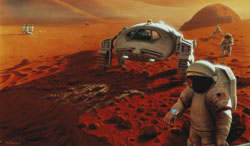Charting the scientific route to manned Mars missions
Scientists initiated the EU-funded project 'Towards human exploration of space: a European strategy' (THESEUS) to develop a scientific roadmap for European human space exploration in the solar system. Near-Earth objects, the Moon and Mars are among the first targets. Currently, the prospects for a manned Mars exploration mission are limited by factors such as prevention of bone loss, protection against ionising radiation and impaired performance during long missions. In addition, technological breakthroughs in life support systems and recycling are required to reduce the cost of long-duration manned missions. THESEUS pulled together more than 120 international experts forming 14 thematic expert groups (EGs) and, through online consultation, supplemented their opinions with those of the scientific community at large. The result was the identification of 99 key scientific priorities comprising important challenges in 5 areas of human spaceflight research. The research areas consist of integrated systems physiology, psychology and human-machine systems, space radiation, habitat management and healthcare. Based on the recommendations made at an integration workshop in June 2011, the THESEUS roadmap was further organised around three main themes. These are adaptation to the space environment, countermeasures to multiple stressors, and necessary tools and techniques. The official THESEUS roadmap and individual EG reports were made available on the project website in March of 2012. THESEUS has established an integrated life sciences research roadmap and a European network to coordinate and implement the strategy. The project has taken advantage of international expertise and evaluated the relevance of proposed priorities to Earth-based and industrial applications. As a result, THESEUS should ensure effective and efficient use of resources for the highest impact of space research and development activities.



